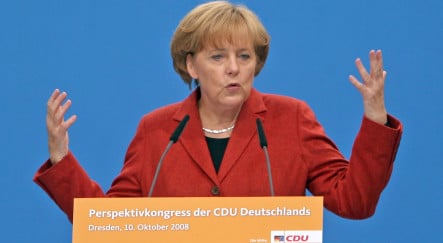“The economy is in the service of people,” not the inverse, she said, and the role of politicians was to show this “clearly.”
Merkel who heads the conservative Christian Democrats, said she was convinced that “the (German) social market economy model is the best rule imaginable in which people can fulfil themselves” in a spirit of “solidarity between the weakest and the strongest.”
Speaking in Dresden shortly before a meeting in Washington of G7 finance ministers on the crisis, she said: “We feel more than ever in these times that it is no longer enough to have national rules. We need rules not merely for Europe but also internationally.”
Finance ministers and central bank governors from the Group of Seven leading industrial countries were to meet to discuss steps taken by each country and ways of strengthening cooperation, US Treasury Secretary Henry Paulson had said.
Merkel’s plea for greater regulation and coordination was backed up by German Finance Minister Peer Steinbrück in Washington as he prepared to attend the G7 meeting: “We need global rules for the markets.”
Germany is of the view that the United States and Britain did not take on board its calls in the last year for revised market rules.
“Today, certain things can no longer be decided at national level and that is why such rules must be put in place,” she said. This was necessary to ensure that “a financial market crisis such as we are experiencing is not repeated.”
Berlin reportedly mulling bank plan
Germany is reportedly working on a plan to part-nationalise the country’s banks along the lines of a similar British move this week, daily Die Welt said on Friday without saying where it got the information.
The plan involves a capital injection of more than €10 billion ($13.5 billion) in return for equity stakes in German banks as well as more than 100 billion euros to guarantee loans between banks, the newspaper said in a pre-release of an article to be published on Saturday.
The paper reported Chancellor Merkel’s cabinet will decide on the plan in the coming days although there is considerable opposition from within Merkel’s conservatives, who are in a ruling coalition with the centre-left Social Democrats.
A German government spokesman declined to comment on the report.
Britain said Wednesday it would make £50 billion ($64 billion) of taxpayers’ money available to buy shares in the country’s banks in return for fresh capital. The three-part British package also makes available £200 billion in short-term loans and another £250 billion to guarantee loans between banks.



 Please whitelist us to continue reading.
Please whitelist us to continue reading.